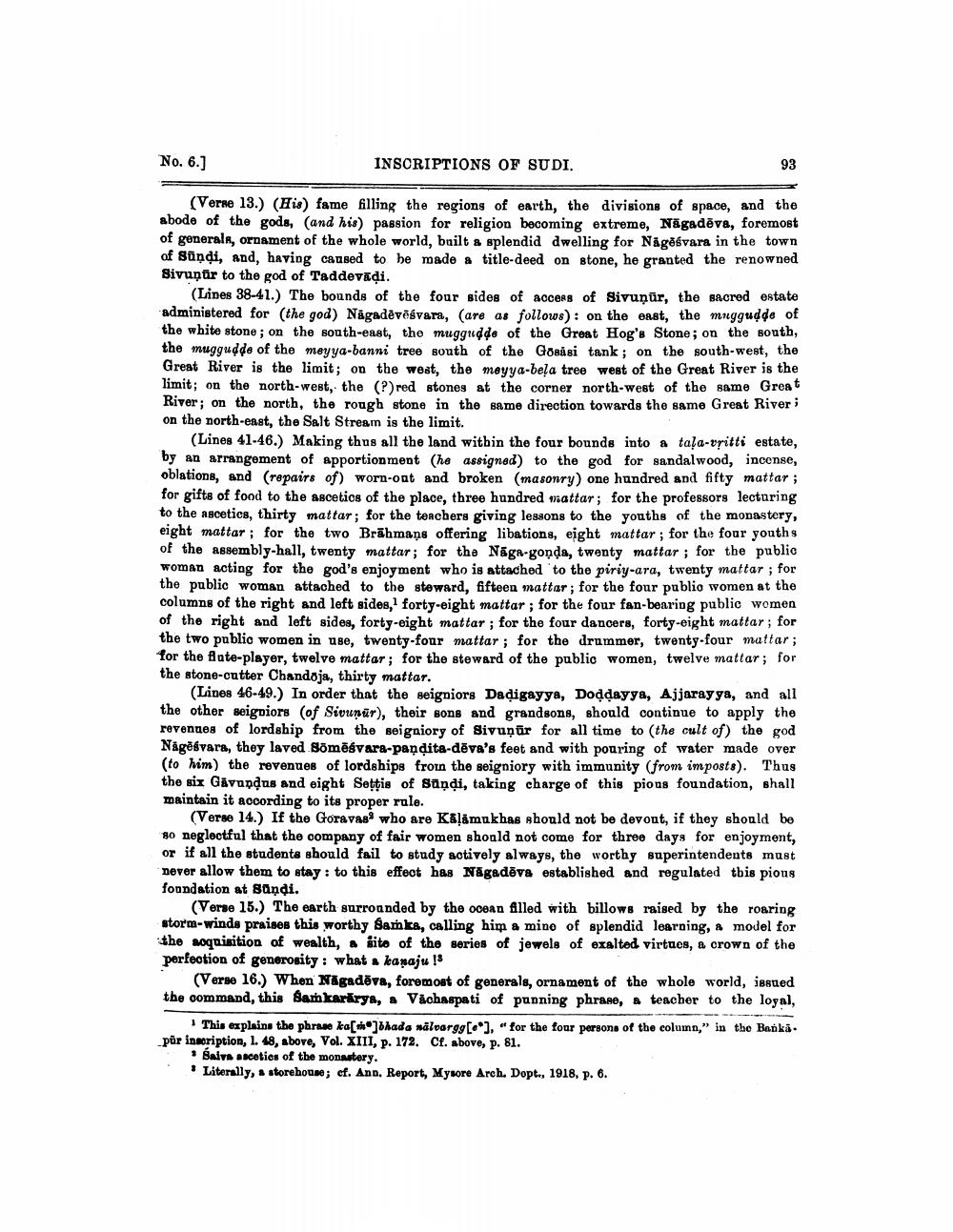________________
No. 6.]
INSCRIPTIONS OF SUDI.
93
(Verse 13.) (His) fame filling the regions of earth, the divisions of space, and the abode of the gods, and his passion for religion becoming extreme, Nägadēva, foremost of generala, ornament of the whole world, built a splendid dwelling for Någośvara in the town of sündi, and, having caused to be made a title-deed on stone, he granted the renowned Sivuņir to the god of Taddevadi.
(Lines 38-41.) The bounds of the four sides of access of Sivuņür, the sacred estate administered for the god) Nägadēvēsvara, are as follows) : on the east, the muggudde of the white stone; on the south-east, the muggudde of the Great Hog's Stone; on the south, the muggudde of the meyya-banni tree south of the Goeäsi tank; on the south-west, the Great River is the limit; on the west, the meyya-beļa tree west of the Great River is the limit; on the north-west, the (?)red stones at the corner north-west of the same Great River; on the north, the rough stone in the same direction towards the same Great River i on the north-east, the Salt Stream is the limit.
(Lines 41-46.) Making thus all the land within the four bounds into a taļa-vritti estate, by an arrangement of apportionment (he assigned) to the god for sandalwood, incense, oblations, and (repairs of) worn-ont and broken (masonry) one hundred and fifty mattar ; for gifts of food to the ascetics of the place, three hundred mattar; for the professors lecturing to the ascetics, thirty mattar; for the teachers giving lessons to the youths of the monastery, eight mattar ; for the two Brāhmans offering libations, eight mattar ; for the four youths of the assembly-hall, twenty mattar; for the Nāga-gonda, twenty mattar ; for the public woman acting for the god's enjoyment who is attached to the piriy-ara, twenty mattar ; for the public woman attached to the steward, fifteen mattar; for the four publio women at the columns of the right and left sides, forty-eight mattar ; for the four fan-bearing public women of the right and left sides, forty-eight mattar ; for the four dancers, forty-eight mattar; for the two public women in use, twenty-four mattar ; for the drummer, twenty-four mattar; for the fate-player, twelve mattar; for the steward of the public women, twelve mattar; for the stone-outter Chandoja, thirty mattar.
(Lines 46-49.) In order that the seigniors Dadigayya, Doddayya, Ajjarayya, and all the other seigniors (of Sivunur), their sons and grandsons, should continue to apply the revenues of lordship from the seigniory of Sivuņür for all time to the cult of) the god Någēsvara, they laved Sömēgvara-pandita-dēva's feet and with pouring of water made over (to him) the revenues of lordships from the seigniory with immunity (from imposts). Thus the six Gāvundus and eight Settis of sündi, taking charge of this pious foundation, shall maintain it according to its proper rule.
(Verse 14.) If the Goravas who are Kálāmukhas should not be devout, if they should be 80 neglectful that the company of fair women should not come for three days for enjoyment, or if all the students should fail to study actively always, the worthy superintendents must never allow them to stay: to this effect has Nāgadēva established and regulated this pions foundation at sundi.
(Verse 15.) The earth surrounded by the ocean filled with billows raised by the roaring storm-winde praises this worthy Samka, calling him a mino of splendid learning, model for the soquisition of wealth, kito of the series of jewels of exaltod virtuos, a crown of the perfection of generosity: what a kanaju 18
(Verse 16.) When Nagadēva, foremost of generals, ornament of the whole world, issued the command, this Samkarirya, a Váchaspati of punning phrase, a teacher to the local, This explains the phrase ka[
m ohada nälvorgg[6"], " for the four persons of the column," in the Banka. por inseription, 1. 48, above, Vol. XIII, p. 172. Cf. above, p. 81.
• Bains asceties of the monastery.
Literally, storehouse; ef. Ann. Report, Mysore Arch. Dopt., 1918, p. 6.




